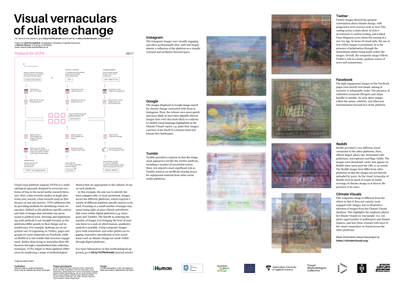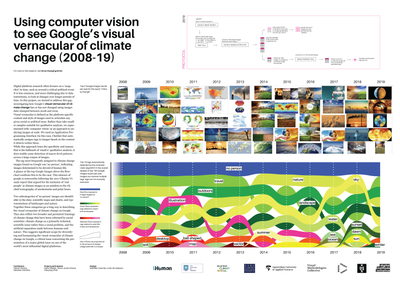Visual cross-platform analysis (VCPA) is a methodological approach designed to overcome two forms of bias in the social media research literature: first, a bias towards studies of single plat- forms and, second, a bias towards analysis that focuses on text and metrics. VCPA addresses this by providing methods for identifying visual vernaculars, defined as the platform-specific content and style of images that articulate any given social or political issue.
IMAGE

This article interrogates platform-specific bias in the contemporary algorithmic media landscape through a comparative study of the representation of pregnancy on the Web and social media. Online visual materials such as social media content related to pregnancy are not void of bias, nor are they very diverse. The case study is a cross-platform analysis of social media imagery for the topic of pregnancy, through which distinct visual platform vernaculars emerge. The authors describe two visualization methods that can support comparative analysis of such visual vernaculars: the image grid and the composite image. While platform-specific perspectives range from lists of pregnancy tips on Pinterest to pregnancy information and social support systems on Twitter, and pregnancy humour on Reddit, each of the platforms presents a predominantly White, able-bodied and heteronormative perspective on pregnancy.
DOCUMENT
In this project, we investigated how the visual vernacular of climate change, defined as the platform-specific content and style of images used to articulate climate change, changed on Twitter between 2016-19. Due to the high number of tweets in the dataset, we focused on smaller time-specific samples of tweets as a manageable way to track change over time.
IMAGE

Digital platform research often focuses on a ‘snap- shot’ in time, such as around a critical political event. It is less common, and more challenging due to data restrictions, to look at changes over longer periods of time. In this project, we started to address this gap, investigating how Google’s visual vernacular of cli- mate change has or has not changed using images date-stamped between 2008 and 2019.
IMAGE

Working as speech acts that delineate online communities, claims to victimhood tend to evoke contestation. Their inherent political nature spurs user engagement in the shape of clicks, shares, emojis, and so on. TikTok’s multimodality has given rise to new practices of engagement that significantly shape how victimhood is communicated and negotiated. This study draws attention to the platform vernacular practice of the ‘stitch.’ Allowing users to respond to someone else by ‘remixing’ social media content of others, the stitch is a platform practice designed for commentary. We zoom in on stitched videos networked by hashtags, published in relation to the Israel-Hamas war. TikTok’s multimodality expands user pathways that connect claimants and those who contest them. Moving beyond hashtag hijacking the stitch elevates a practice of commentary that turns victimhood politics into a spectacle that politicizes formerly less political realms, and that further blurs the boundaries between on- and offline spaces. The analysis shows how stitched videos are especially used for antagonist encounters where they crowd out the ‘original’ post to which they respond. In this way, stitches can be seen as tools that aid platformed ‘regimes’ of visibility that prioritize the antagonist encounter in order to commodify them.
MULTIFILE

Citizen participation is booming, especially the number of urban bottom-up initiatives where information and communication technologies (ICT) are deployed is increasing rapidly. This growth is good news for society as recent historical research shows that the more citizens actively and persistently interfere with public issues, the more likely a society will be resilient. And yet, at the same time, a growing number of scholars argue that due to the unprecedented impact of ICT, the public sphere is at stake. How to understand both trends? How do the anti-‘public sphere’ developments relate to the growing number of citizens’ initiatives using ICT? And if these citizen initiatives can indeed be understood as manifestations of public spheres, how can ICT foster or hinder the development of these public spheres? These questions will be explored by analyzing a Dutch citizen initiative called ‘Buuv’ (an online ‘market’ place for and by local residents) from a ‘public sphere’ perspective. The author will turn to The human condition (1958) of Hannah Arendt in order to elaborate a ‘public sphere’ perspective. An Arendtian perspective (as any perspective) highlights, however, some aspects and underexposes other aspects. Furthermore, chances are that Arendt’s thoughts are somewhat outdated, in the sense that we now live in a world where the online and the offline life intertwine — an experience that is referred to with the term ‘onlife’. Bearing these remarks in mind, the author will elaborate on the value of Arendt’s ideas to 1) the endeavor of understanding current trends in society—more urban bottom-up initiatives and anti-‘public sphere’ developments due to the broad uptake of ICT—and 2) the endeavor of revitalizing the public sphere in an onlife world. IEEE copyright
MULTIFILE

Fans constitute a very special kind of audience. They have been marginalized, ridiculed and stigmatized, yet at the same time they seem to represent the vanguard of new relationships with and within the media. ‘Participatory culture’ has become the new normative standard. Concepts derived from early fan studies, such as transmedial storytelling and co-creation, are now the standard fare of journalism and marketing text books alike. Indeed, usage of the word fan has become ubiquitous. The Ashgate Research Companion to Fan Cultures problematizes this exaltation of fans and offers a comprehensive examination of the current state of the field. Bringing together the latest international research, it explores the conceptualization of ‘the fan’ and the significance of relationships between fans and producers, with particular attention to the intersection between online spaces and offline places.
DOCUMENT

This deaf-led work critically explores Deaf Tech, challenging conventional understandings of technologies ‘for’ deaf people as merely assistive and accessible, since these understandings are predominantly embedded in medical and audist ideologies. By employing participatory speculative workshops, deaf participants from different European countries envisioned technologies on Eyeth - a mythical planet inhabited by deaf people - centered on their perspectives and curiosities. The results present a series of alternative socio-technical narratives that illustrate qualitative aspects of technologies desired by deaf people. This study advocates for expanding the scope of deaf technological landscapes, emphasizing the needs of establishing deaf-centered HCI, including the development of methods and concepts that truly prioritize deaf experiences in the design of technologies intended for their use.
MULTIFILE

Technology and architectural solutions are needed as a means of support in future nursing homes. This study investigated how various monodisciplinary groups of stakeholders from healthcare and technology envision the nursing home of the future and which elements are necessary for its creation. Moreover, differences in needs and interests between the various stakeholders were considered. This qualitative study gathered data via 10 simultaneous sticky note brainstorm sessions with 95 professional stakeholders, which resulted in 1459 quotes in five categories that were clustered into themes and processed into word clouds. The stakeholders prioritized the needs of the resident and placed the most importance on the fact that a nursing home is primarily a place to live in the final stages of one's life. A mix of factors related to the quality of care and the quality of the built environment and technology is needed. Given the fact that there are differences in what monodisciplinary groups of stakeholders see as an ideal nursing home, multidisciplinary approaches should be pursued in practice to incorporate as many new views and stakeholder needs as possible.
DOCUMENT
